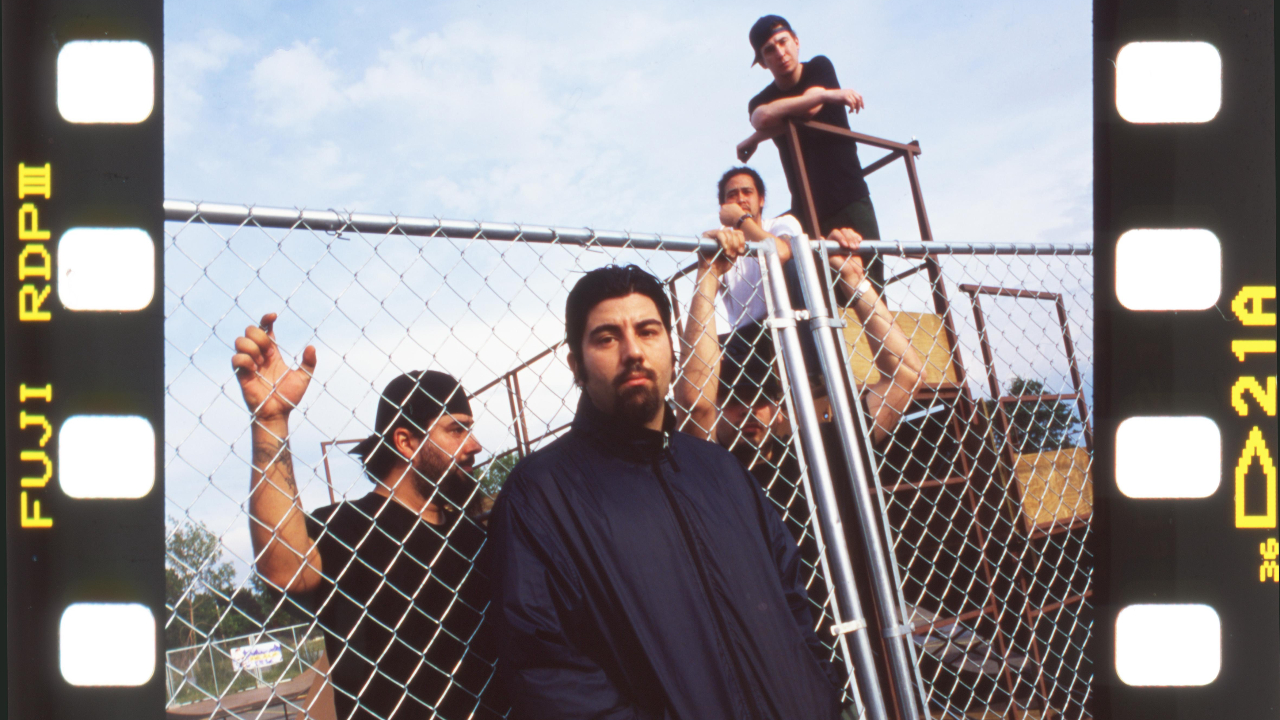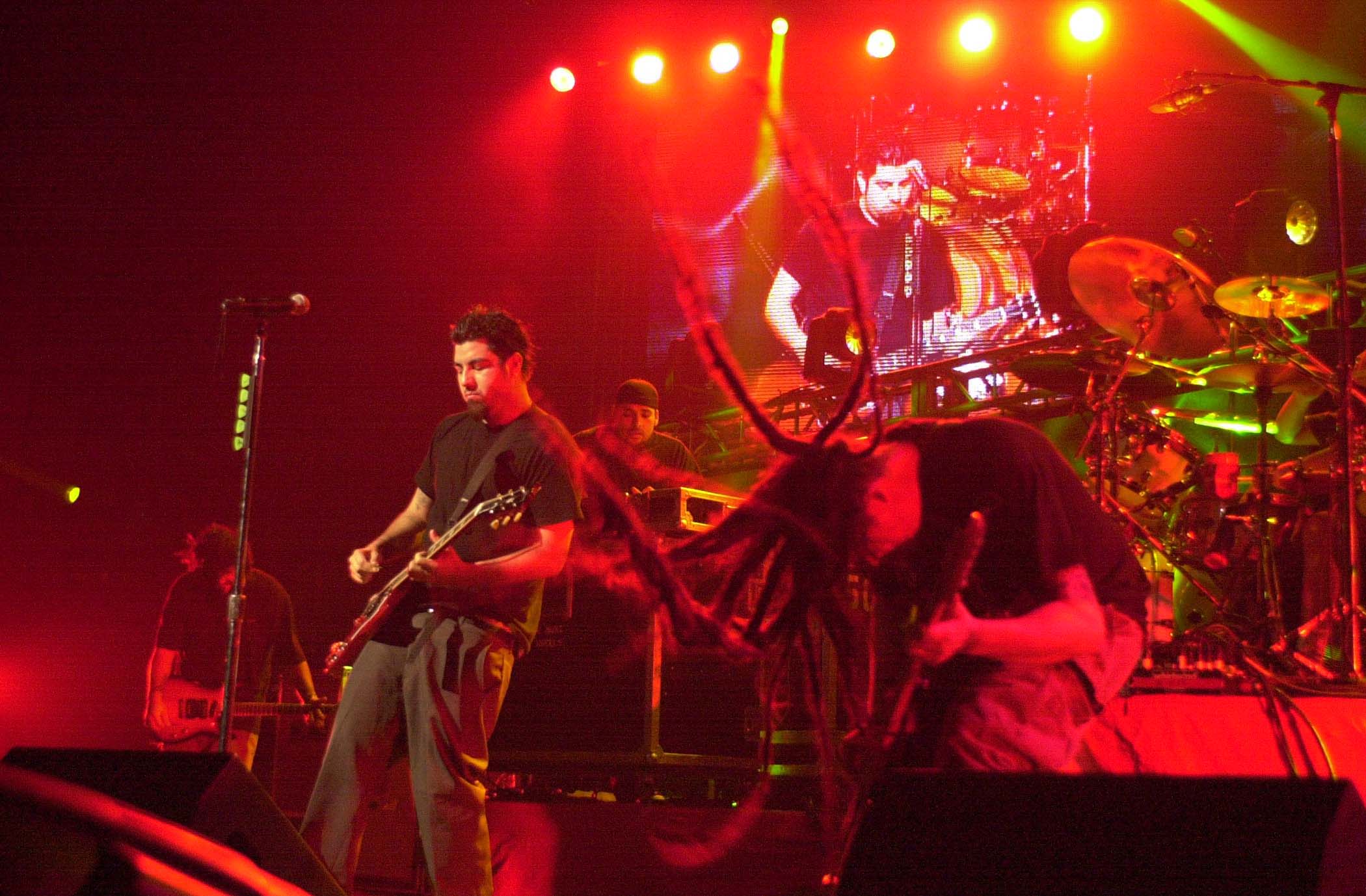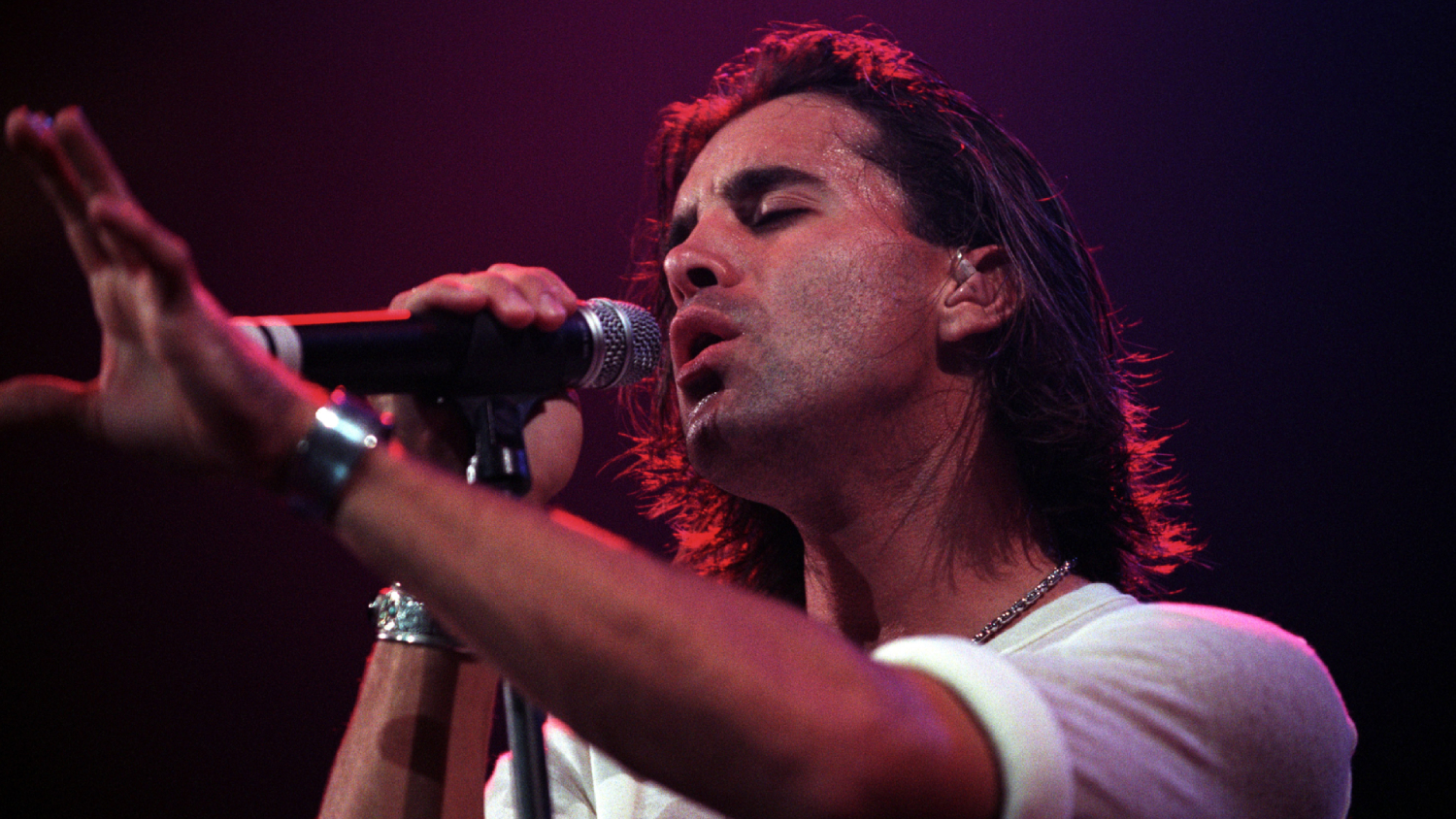"It was terrible! I was naked and I just froze. There was blood everywhere." Haunted houses, "turf wars" and Mimosa Mondays: the story of the album that confirmed Deftones as one of the most important bands of their generation
From drug-fuelled parties to in-band fighting, the story behind this classic is a full of drama as it is great songs

In the summer of 2020, as Deftones' career-defining, hugely influential third studio album White Pony turned 20 years old, Metal Hammer sat down for an interview with the band to discuss that record's legacy, the wild adventures they were having around that time and why, decades on, they made the right decision in dodging the nu metal bullet.

An unbearable, sharp pain in the head. A horrible realisation. A torrent of blood. Deftones drummer Abe Cunningham, relieved at finally finishing White Pony after four months of nonstop recording and partying, had ripped off his clothes and jumped backwards onto his bed for the best sleep ever. Only, there was a double-ended knife sticking out of the fireplace he was using as a headboard. He’d stabbed it in there a few weeks earlier, just to be cool. Now, he’d impaled himself.
“It was terrible,” he laughs today. “I was naked, and I just knew. ‘Fuck! I just hit that fucking knife, that goddamn knife!’ And I froze up. There was blood everywhere.”
It was a fitting conclusion to the chaotic creative process for one of the greatest heavy albums of the 21st century. There had been bloodshed, in-fighting, videogame obsessions, cocaine-fuelled parties and unexpected celebrity guests, these multiple voices and experiences fuelling the explosion of originality heard across White Pony’s 11 tracks. It was an evolution of their sound, an anomaly in the metal scene, and confusing for their fanbase. No one had seen it coming.
Deftones had formed in Sacramento in the late 80s and signed to Madonna’s label, Maverick, before releasing their debut album, Adrenaline, in 1995. It was a raw outburst of impulsive young energy, taking 90s alt-metal and mixing it with unhinged screams and blunt, abrasive riffs. Two years later, follow-up Around The Fur bumped up the quiet-loud-quiet dynamics and showcased more range and depth, propelling them to major festival stages and headline tours.
In many people’s eyes, they were a nu metal band. But for album number three, they had something else in mind. Rather than continuing steadily along the same path, or adopting the swagger-filled posturing of rising peers like Limp Bizkit, they pushed into a new universe of endless atmosphere, unearthly textures and abstract lyrics. Instead of putting out party metal, they made ambitious, timeless, mind-expanding music while partying.
“We came off a couple of records that were pretty successful, but I felt like we had a lot more to do,” explains vocalist Chino Moreno. “A bigger voice, and really no rules.”
Sign up below to get the latest from Metal Hammer, plus exclusive special offers, direct to your inbox!

If you’d walked into Deftones’ rehearsal studio in midsummer 1999, you would have seen a 10-foot halfpipe. You might have witnessed Chino doing kickflips, or guitarist Stephen Carpenter trying tricks on his bike. ‘The Spot’ was part workspace and part clubhouse, with Iron Maiden posters adorning the walls and a steady stream of friends coming and going, shooting the shit or pulling off shove-its between practice sessions.
Skating was such a priority that the band even measured how much space they needed to get their road-cases through, and only allowed an extra inch on each side so they could make the ramp as big as possible. “It was a hangout spot,” smiles Abe. “All the while, we would just be testing out new music and drinking beer, and having the time of our lives.”
By this point, Deftones had already begun work on White Pony, and had even displayed the iconic graphic on their backdrop for that year’s Ozzfest, their set sandwiched between Slayer and Rob Zombie.
They’d also been trialling new song Korea, a low-down, grinding pit-crusher. At the tour’s close, Stephen had moved to Los Angeles, while Chino, Abe and turntablist Frank Delgado stayed home in Sacramento, tinkering with ideas at The Spot. A few times a month, Stephen would make the six-hour drive to jam with them. When he was absent, Chino would pick up one of Stephen’s guitars and experiment with it – something that would later cause friction.
“I was very green to the guitar, but I just loved playing it,” Chino explains in a soft drawl. “It’s kind of weird that I’m the singer, because one of my least favourite things to do is to express myself through words, and guitar is a great way to express yourself without having to do that. Although, Stephen wasn’t really too keen on it. He’s always been the guitar player, so I was treading on his ground a little bit. He never really told me not to, but I could tell that he was like, ‘Well, whatever. Let him get it out of his system, and then we’ll move on.’”
That August, they went into The Plant in Sausalito, over the Golden Gate Bridge from San Francisco. The historic studio had previously hosted the rock’n’roll likes of Stevie Wonder, Prince and Santana (“you try to rest your elbows on the studio wall and get a little bit of that mojo!” laughs Abe).
While second album Around The Fur was completed in four months, they had been writing White Pony for six before they even had enough songs to fill the record, and were only two-thirds done before they hit The Plant. “We went into the studio really, really ill-prepared, but I think that was the fun of it too,” remembers Chino. “As much as we knew we wanted to make a record that was different, we wanted to capture a moment as opposed to going in and knocking it out. We really wanted to experience the ‘record making’.”
Experience it they did. The sleepy fishing city of Sausalito is known for its colourful houseboats, where the band lived together: Chino and Abe, Stephen and Frank, and bassist Chi Cheng in a nearby apartment with his wife and son.
Every day they would ride their bikes to the studio, which boasted a lounge area with a kitchen, a huge television and couches, where they would smoke, drink and obsessively play the videogame Tony Hawk’s Pro Skater. Far from getting the guitar out of his system, Chino was getting deeper into it. He’d sit in the kitchen with a digital recorder, developing his newfound skills.
“I had a little recording set-up in the kitchen, and we’d throw around ideas real quick, and then do a little bit of work, and we drank a lot of champagne,” he smiles. “We’d have Mimosa Mondays, and then it turned into Mimosa Tuesdays and Wednesdays and Thursdays. We had a blast, seriously, hanging out and being young adults in a nice studio making a record that we wanted to make. We were living our best life at that time.”
We’d have Mimosa Mondays...then it turned into Mimosa Tuesdays and Wednesdays and Thursdays.
Chino Moreno
Despite only being in their mid-20s, most of Deftones had known each other for years, stretching back to their schooldays. They were as close as brothers, and would drive each other just as crazy. And so it was with Chino and Stephen. The frontman, a fan of electronic music who was discovering new abilities. The guitarist, a Meshuggah fan used to taking the lead, who would walk out the studio and threaten to quit.
“Stephen and I… I don’t think we were trying to outdo each other for competition, but we were trying to inspire each other in a way,” Chino says diplomatically. “So I’d come up with an idea, and then I’d bring it to him, and he’d say, ‘Oh, that’s cool. How about this?’ And then he’d come up with something, and would top that idea. And then I’d say, ‘OK, well what about this?’
"And top that. Not as a competition, but pushing each other to see how far we can go. And I think that really benefited the record, because there was no way you were going to have this linear-sounding thing, when each of us were trying to see how far we could push each other. Our relationship started to be strained a little bit at that point, but musically I think we prospered.”
Abe is more direct. “These guys would just scream!” he laughs. “Chi, too. They would scream like fucking crazy. So it was tense, but the funny thing was, Chino just really enjoyed playing guitar. He was not the best guitarist at all, but he was learning, and learning in front of the world. He wasn’t trying to get to Stephen, but Stephen was not happy.”
Their producer, Terry Date, agrees there were “turf wars”, while he argued about studio time lost to the band’s addiction to Tony Hawk’s Pro Skater. “Terry would come in furious,” remembers Abe. “His glasses would be all steamed up, and he’d be like, ‘Goddamnit, get in there!’”
Yet when Deftones focused, they made some amazing breakthroughs. Terry, who had helmed both their records, initially suggested they consider other producers, in case they wanted a fresh perspective on their music. But after meeting with the likes of Rick Rubin and Talking Heads keyboardist/guitarist Jerry Harrison, the band had opted for him again. They were comfortable with him, he knew how to get the best from them – and besides, there was no shortage of ideas flying around.

Chino and Stephen leaned into their push-pull dynamic to write Change (In The House Of Flies), White Pony’s first single and a career-defining song. Opening with a mournful riff, eerie noises and breathy vocals, it erupted into a climactic chorus with an edge of danger, like staring directly into a beautiful, exploding sun.
“I knew that it was one of the best songs on the record,” reveals Chino. “I could hear it, and one of the important things about it was that Stephen and I wrote it together; we were playing off each other. So it was very organic, and everybody is represented. Frank’s part in that song is just as important as the drum beat – that wailing sound that you hear in the background of the verses. It adds this certain cryptic quality to the song that always tugged at you in this weird way.”
Turntablist Frank Delgado had met Deftones at the beginning of their career, when he was DJ’ing at Sacramento’s Cattle Club. Although he’d contributed to some songs and toured on Around The Fur, he’d only just been appointed an official member, and his imaginative, spacey soundscapes would be crucial in shaping White Pony. He’d hear the band coming up with ideas, dig through records to find something that fit with the key, and figure out a way to use a sample. Sometimes, necessity proved to be the mother of invention: as he couldn’t afford a synthesiser, he’d manipulate a sample to sound like one.
“On Change…, it’s a short sample, but I extended it with some guitar pedals that Stephen gave me,” he explains. “And then I would play it with the pitch on the turntable to get notes and melodies. So it sounds like a synthesiser, but it’s not.”
It was the same with Teenager. As Frank didn’t have a drum machine, they used lo-fi hip hop beats from his childhood friend, DJ Crook. It was common for nu metal bands to have DJs, but Frank was doing more than tokenistic scratching. Like the hip hop he loved, and the DIY skateboarding culture the band grew up in, he was borrowing sounds from across the musical spectrum and making them Deftones’ own.
“We loved everything and anything, so we would grab and pull things,” says Frank. “It’s kind of the same way they brought me into their mix; it wasn’t a preconceived notion that they needed a DJ, they just saw there was something there that was working, that was really cool, and pulled it into their world.”
“There were no boundaries of what kind of record we were supposed to make,” states Chino. “As a band, we weren’t limiting ourselves to, ‘We’re this four-piece band who makes aggressive rock music.’ We were able to expand.”
The band’s record deal was what Abe refers to as a “twofer”: no matter what the sales of the first album, they were guaranteed a second. Having crossed that threshold with success, they felt liberated. “We had everything to prove but yet nothing at all,” says Abe. “We only had to prove it to ourselves.”
Deftones had gone to Hollywood when they finished Around The Fur, but they had never lived in Hollywood. It was about to become their new playground. Relocating to Larrabee Sound Studios for mixing, they took up residence in a mansion Abe says was previously owned by Chuck Berry. “It had these crazy little mini doors and Scooby-Doo book- shelves, and it was haunted as hell,” he insists. This is where he would have the knife incident.
The mansion, off Sunset Strip, was also where they’d have friends over to rage all night. If they weren’t at home, they were running riot between the bright streets and dark alleyways of Tinseltown. Deftones already had a reputation; after all, the cover photo of Around The Fur was a bikini-clad woman taken at one of their hot-tub parties. “Some nights were super-wild,” confesses Chino. “I think it just added to what White Pony was. There’s some dark themes on there, certainly hinting at that kind of stuff, and I wouldn’t say it’s a party record by any means, but I think it has… a little sleazy vibe. And I feel like that’s how we were living. It kind of crawled its way into the music.”
Now 20 years older and living in different times, they’re unsurprisingly reluctant to disclose details of any X-rated activities. Did they have adult actresses over? Were they going to strip clubs? “You don’t need me to tell you – you know exactly what happened,” Abe grins. “We were fucking young, having a fucking blast, doing a bunch of blow, drinking, partying. Lots of cocaine, tons of it. But it was not everyone in the band.”
As with Sausalito, they also put in the graft, continuing their “grab and pull” approach with a string of unexpected guest vocalists. Rodleen Getsic, whose spinetingling screams cleave Knife Prty, was a singer Chino met while playing pool in the studio’s lounge. Late Stone Temple Pilots frontman Scott Weiland, who had just served time for violating probation following a conviction for heroin possession, ended up on Rx Queen after a call from Deftones’ A&R man, Guy Oseary.
It had these crazy little mini doors and Scooby-Doo book- shelves. It was haunted as hell
Abe Cunningham
“That was kind of a trip,” recalls Chino. “He wanted Scott to get out of jail, and have something to do that would take him away from whatever he was doing that landed him in jail. I went to his studio in the Valley, and we were listening to Rx Queen, and he had a little harmony idea so he picked up the mic. It’s a total Weiland harmony, something I wouldn’t think to write.”
The most high-profile turn came from Tool’s Maynard James Keenan on the windswept, nocturnal Passenger. He had been there when Deftones wrote the song in ’99, prior to demoing. The day before vocals were due to be recorded, Chino invited him to collaborate.
“We sat next to each other in front of the control board, and put the music on. It was really cool the way we wrote it – we shared a notebook, and he wrote a line, and I’d write a line, and then I’d hand it back to him to write a line, and he’d hand it back to me. So the way you hear the song on the record is pretty genuine to the way we wrote it, where we trade lines. We didn’t really have an idea for what we were making a song about, we just started riffing off each other,” says Chino, sounding incredulous. “Even to this day, I don’t think I’ve worked that way with anybody. I was super-stoked with it.”
Chino disliked writing lyrics so much that Adrenaline is riddled with garbled vocalisations. Immersing himself in instrumental music, he sought to distance himself from the trends of heavy music, turning instead to abstract phrases. White Pony lurched between vertiginous stories and erotic scenarios, glinting with deathly metaphors for love and power, like a string of woozy fever dreams that left shadows on the brain.
“Music with words was a drag to me,” Chino explains. “Coming out of what grunge was, and it was ‘pity life, life sucks, this and that’. And then nu metal, which was sort of the same complaining about how lame the world is. I just didn’t wanna hear that shit anymore.”

White Pony was released on June 20, 2000 – Chino Moreno’s 27th birthday. Anticipation for the record was such that Deftones appeared on David Letterman that night, performing Change (In The House Of Flies). The band loved the song so much, they had insisted it should be the first single, even though their record label didn’t think it was aggressive enough to lead the album campaign.
And while it would turn out to be a commercially successful hit, that hesitation was understandable; in a climate where Limp Bizkit and Papa Roach were some of the buzziest bands around, White Pony was a curveball for fans, who accused Deftones of turning their back on heaviness.
“That record wasn’t loved right away,” cautions Chino. “As much as Deftones fans love it now, they didn’t. Because we were known more as a ‘nu metal’ band. They were trying to box us into that. White Pony separated ourselves from that genre that was at its peak, so I still felt like we were in an uphill battle to earn our place.”
The record sold decently, reaching Gold status (500,000 copies) within three months, but Maverick thought it could do better. Claiming there wasn’t an obvious second single, they suggested taking the woozy chorus from Pink Maggit and stretching it into something more up-tempo and marketable. The result was Back To School (Mini Maggit), accompanied by a now-iconic video of Chino rapping while stomping over desks and skating down hallways. White Pony was re-released with Back To School as its first track.
“They asked a few times, and then the straw that broke the camel’s back was when I got a phone call from Guy Oseary and he said, ‘I just got off the phone with Paul Hunter’, who at the time was a huge video director. He had done Britney Spears, Eminem videos. And budgets back then were one million dollars starting. They were super-expensive.
But he said, ‘You guys do this, we’ll pay for it, blah blah, this and that.’ And at that point I was like, ‘Alright, whatever, we’ll do it,’” says Chino. “In retrospect, do I regret it? No, not really. It is what it is. But do I prefer the record the way it was before that song was on it? Yeah.”
“We were pissed!” exclaims Abe. “We were fucking pissed. How dare you make us change this shit, and try to fit into what’s going on right now?”
Acclaim from the establishment came with a Best Metal Performance Grammy for Elite, but Deftones were still trying to navigate their way through a nu metal minefield. The fivesome turned down significant tours with the likes of Korn, Papa Roach and Limp Bizkit in an effort to distance themselves from a scene they didn’t see a future in, but they were well aware of how this made them look – especially in the eyes of the musicians they considered friends.
“I think they would get bummed, kind of like we were being dicks ’cause we didn’t wanna tour with any of them,” admits Chino. “But now in retrospect, I feel like it was probably one of the most important decisions we had to make. Now, if I see an article in a magazine about nu metal, I’ll scan through it to see if we’re in there. If we’re not, I get so stoked, like, ‘Wow, we dodged that bullet!’”
Twenty years on, White Pony is a timeless classic that transcends the boundaries of metal’s tribal subgenres. Artistically, it’s extraordinary – diverse influences crash in harsh maelstroms or coalesce in melodic ambience, the songs smoothly flowing into each other. Commercially, it has continued to sell steadily, and has shifted three million copies worldwide.
“We didn’t know if people would like White Pony, we just did it anyways. And for that reason, I’m really proud of it,” Chino concludes. “But I also think that’s why it’s still successful, because we followed our instincts.”
“I’m proud of that little pony, that’s now… an older horse!” adds Abe. “It’s out in pastures, running around free.”
Originally published in Metal Hammer #337

Eleanor was promoted to the role of Editor at Metal Hammer magazine after over seven years with the company, having previously served as Deputy Editor and Features Editor. Prior to joining Metal Hammer, El spent three years as Production Editor at Kerrang! and four years as Production Editor and Deputy Editor at Bizarre. She has also written for the likes of Classic Rock, Prog, Rock Sound and Visit London amongst others, and was a regular presenter on the Metal Hammer Podcast.
You must confirm your public display name before commenting
Please logout and then login again, you will then be prompted to enter your display name.

![Deftones - Change (In The House Of Flies) [Official Music Video] - YouTube](https://img.youtube.com/vi/WPpDyIJdasg/maxresdefault.jpg)
![Deftones - Back To School (Mini Maggit) [Official Music Video] - YouTube](https://img.youtube.com/vi/1gxZIL4zpIQ/maxresdefault.jpg)
![Deftones - Street Carp [Official Music Video] - YouTube](https://img.youtube.com/vi/hbknq6azohw/maxresdefault.jpg)
